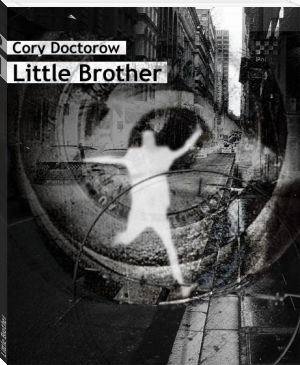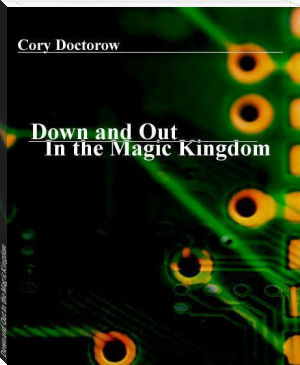Little Brother - Cory Doctorow (book recommendations website txt) 📗

- Author: Cory Doctorow
Book online «Little Brother - Cory Doctorow (book recommendations website txt) 📗». Author Cory Doctorow
When Dad came back, he looked angrier than he ever had in his life.
"You should have told me!" he roared.
Mom interposed herself between him and me. "You're blaming the wrong person," she said. "It wasn't Marcus who did the kidnapping and the intimidation."
He shook his head and stamped. "I'm not blaming Marcus. I know exactly
who's to blame. Me. Me and the stupid DHS. Get your shoes on, grab your coats."
"Where are we going?"
"To see Darryl's father. Then we're going to Barbara Stratford's place."
I knew the name Barbara Stratford from somewhere, but I couldn't remember where. I thought that maybe she was an old friend of my parents, but I couldn't exactly place her.
Meantime, I was headed for Darryl's father's place. I'd never really felt comfortable around the old man, who'd been a Navy radio operator and ran his household like a tight ship. He'd taught Darryl Morse code when he was a kid, which I'd always thought was cool. It was one of the ways I knew that I could trust Zeb's letter. But for every cool thing like Morse code, Darryl's father had some crazy military discipline that seemed to be for its own sake, like insisting on hospital corners on the beds and shaving twice a day. It drove Darryl up the wall.
Darryl's mother hadn't liked it much either, and had taken off back to her family in Minnesota when Darryl was ten -- Darryl spent his summers and Christmases there.
I was sitting in the back of the car, and I could see the back of Dad's head as he drove. The muscles in his neck were tense and kept jumping around as he ground his jaws.
Mom kept her hand on his arm, but no one was around to comfort me. If only I could call Ange. Or Jolu. Or Van. Maybe I would when the day was done.
"He must have buried his son in his mind," Dad said, as we whipped up through the hairpin curves leading up Twin Peaks to the little cottage that Darryl and his father shared. The fog was on Twin Peaks, the way it often was at night in San Francisco, making the headlamps reflect back on us. Each time we swung around a corner, I saw the valleys of the city laid out below us, bowls of twinkling lights that shifted in the mist.
"Is this the one?"
"Yes," I said. "This is it." I hadn't been to Darryl's in months, but I'd spent enough time here over the years to recognize it right off.
The three of us stood around the car for a long moment, waiting to see who would go and ring the doorbell. To my surprise, it was me.
I rang it and we all waited in held-breath silence for a minute. I rang it again. Darryl's father's car was in the driveway, and we'd seen a light burning in the living room. I was about to ring a third time when the door opened.
"Marcus?" Darryl's father wasn't anything like I remembered him. Unshaven, in a housecoat and bare feet, with long toenails and red eyes. He'd gained weight, and a soft extra chin wobbled beneath the firm military jaw. His thin hair was wispy and disordered.
"Mr Glover," I said. My parents crowded into the door behind me.
"Hello, Ron," my mother said.
"Ron," my father said.
"You too? What's going on?"
"Can we come in?"
His living room looked like one of those news-segments they show about abandoned kids who spend a month locked in before they're rescued by the neighbors: frozen meal boxes, empty beer cans and juice bottles, moldy cereal bowls and piles of newspapers. There was a reek of cat piss and litter crunched underneath our feet. Even without the cat piss, the smell was incredible, like a bus-station toilet.
The couch was made up with a grimy sheet and a couple of greasy pillows and the cushions had a dented, much-slept-upon look.
We all stood there for a long silent moment, embarrassment overwhelming every other emotion. Darryl's father looked like he wanted to die.
Slowly, he moved aside the sheets from the sofa and cleared the stacked, greasy food-trays off of a couple of the chairs, carrying them into the kitchen, and, from the sound of it, tossing them on the floor.
We sat gingerly in the places he'd cleared, and then he came back and sat down too.
"I'm sorry," he said vaguely. "I don't really have any coffee to offer you. I'm having more groceries delivered tomorrow so I'm running low --"
"Ron," my father said. "Listen to us. We have something to tell you, and it's not going to be easy to hear."
He sat like a statue as I talked. He glanced down at the note, read it without seeming to understand it, then read it again. He handed it back to me.
He was trembling.
"He's --"
"Darryl is alive," I said. "Darryl is alive and being held prisoner on Treasure Island."
He stuffed his fist in his mouth and made a horrible groaning sound.
"We have a friend," my father said. "She writes for the Bay Guardian
. An investigative reporter."
That's where I knew the name from. The free weekly Guardian
often lost its reporters to bigger daily papers and the Internet, but Barbara Stratford had been there forever. I had a dim memory of having dinner with her when I was a kid.
"We're going there now," my mother said. "Will you come with us, Ron? Will you tell her Darryl's story?"
He put his face in his hands and breathed deeply. Dad tried to put his hand on his shoulders, but Mr Glover shook it off violently.
"I need to clean myself up," he said. "Give me a minute."
Mr Glover came back downstairs a changed man. He'd shaved and gelled his hair back, and had put on a crisp military dress uniform with a row of campaign ribbons on the breast. He stopped at the foot of the stairs and kind of gestured at it.
"I don't have much clean stuff that's presentable at the moment. And this seemed appropriate. You know, if she wanted to take pictures."
He and Dad rode up front and I got in the back, behind him. Up close, he smelled a little of beer, like it was coming through his pores.
It was midnight by the time we rolled into Barbara Stratford's driveway. She lived out of town, down in Mountain View, and as we sped down the 101, none of us said a word. The high-tech buildings alongside the highway streamed past us.
This was a different Bay Area to the one I lived in, more like the suburban America I sometimes saw on TV. Lots of freeways and subdivisions of identical houses, towns where there weren't any homeless people pushing shopping carts down the sidewalk -- there weren't even sidewalks!
Mom had phoned Barbara Stratford while we were waiting for Mr Glover to come downstairs. The journalist had been sleeping, but Mom had been so wound up she forgot to be all British and embarrassed about waking her up. Instead, she just told her, tensely, that she had something to talk about and that it had to be in person.
When we rolled up to Barbara Stratford's house, my first thought was of the Brady Bunch place -- a low ranch house with a brick baffle in front of it and a neat, perfectly square lawn. There was a kind of abstract tile pattern on the baffle, and an old-fashioned UHF TV antenna rising from behind it. We wandered around to the entrance and saw that there were lights on inside already.
The writer opened the door before we had a chance to ring the bell. She was about my parents' age, a tall thin woman with a hawk-like nose and shrewd eyes with a lot of laugh-lines. She was wearing a pair of jeans that were hip enough to be seen at one of the boutiques on Valencia Street, and a loose Indian cotton blouse that hung down to her thighs. She had small round glasses that flashed in her hallway light.
She smiled a tight little smile at us.
"You brought the whole clan, I see," she said.
Mom nodded. "You'll understand why in a minute," she said. Mr Glover stepped from behind Dad.
"And you called in the Navy?"
"All in good time."
We were introduced one at a time to her. She had a firm handshake and long fingers.
Her place was furnished in Japanese minimalist style, just a few precisely proportioned, low pieces of furniture, large clay pots of bamboo that brushed the ceiling, and what looked like a large, rusted piece of a diesel engine perched on top of a polished marble plinth. I decided I liked it. The floors were old wood, sanded and stained, but not filled, so you could see cracks and pits underneath the varnish. I really
liked that, especially as I walked over it in my stocking feet.
"I have coffee on," she said. "Who wants some?"
We all put up our hands. I glared defiantly at my parents.
"Right," she said.
She disappeared into another room and came back a moment later bearing a rough bamboo tray with a half-gallon thermos jug and six cups of precise design but with rough, sloppy decorations. I liked those too.
"Now," she said, once she'd poured and served. "It's very good to see you all again. Marcus, I think the last time I saw you, you were maybe seven years old. As I recall, you were very excited about your new video games, which you showed me."
I didn't remember it at all, but that sounded like what I'd been into at seven. I guessed it was my Sega Dreamcast.
She produced a tape-recorder and a yellow pad and a pen, and twirled the pen. "I'm here to listen to whatever you tell me, and I can promise you that I'll take it all in confidence. But I can't promise that I'll do anything with it, or that it's going to get published." The way she said it made me realize that my Mom had called in a pretty big favor getting this lady out of bed, friend or no friend. It must be kind of a pain in the ass to be a big-shot investigative reporter. There were probably a million people who would have liked her to take up her cause.
Mom nodded at me. Even though I'd told the story three times that night, I found myself tongue-tied. This was different from telling my parents. Different from telling Darryl's father. This -- this would start a new move in the game.
I started slowly, and watched Barbara take notes. I drank a whole cup of coffee just explaining what ARGing was and how I got out of school to play. Mom and Dad and Mr Glover all listened intently to this part. I poured myself another cup and drank it on the way to explaining how we were taken in. By the time I'd run through the whole story, I'd drained the pot and I needed a piss like a race-horse.
Her bathroom was just as stark as the living-room, with a brown, organic soap that smelled like





Comments (0)